Small businesses are prime targets for cybercriminals, and there’s a clear rationale behind it
Small businesses stand as prime targets for hackers, facing a myriad of modern cyberthreats. This guide aims to assist small business owners in grasping the present threat environment. It delves into why nefarious actors are increasingly targeting small businesses, the tactics they employ to breach your systems, the vulnerabilities that render your business susceptible to attacks, and the profound impact that data breaches and malware infestations can exert on your business’s operations and growth prospects.
Knowledge Is Power.
You will also learn smart and actionable tactics on how to build and maintain a strong cybersecurity posture that can help you defend your data and systems from cybercriminals. We have included a hypothetical but very realistic case study on just how easily malicious code or ransomware can enter and infiltrate your network, as well as some startling statistics on the growing number of small businesses being targeted by cybercriminals.
Make sure to check out our interactive Phishing Email Exercise at the end of this report to discover if your employees are able to identify some distinctive characteristics of a phishing email.

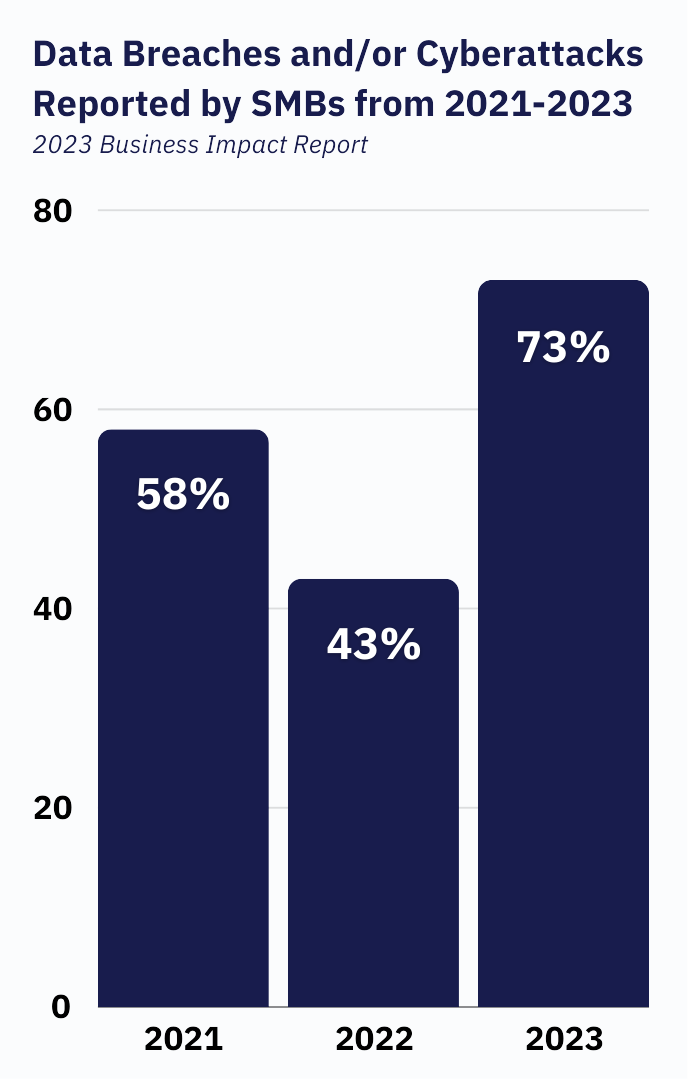
Top 4 Reasons Your Small Business Is a
Prime Target for Cybercriminals
Small business owners often underestimate the significant cyberthreats facing their enterprises. Are you among them? To cybercriminals, your small business presents unique access opportunities that larger organisations may not offer.
Reason 1: Limited Budgets
Small businesses frequently lack the financial resources required to establish robust cybersecurity measures. Hackers are aware of this vulnerability and often target smaller, less fortified business systems instead of larger organisations with stronger security protocols. By failing to allocate sufficient resources to cybersecurity, small businesses inadvertently increase their susceptibility to cybercrime.
“There are only two types of companies: those that have been hacked, and those that will be.” – Robert Mueller, former Director of the FBI
Reason 2: Easy Access to Valuable Data
Data represents the ultimate prize for cybercriminals, and small businesses are not exempt from this targeting. While their data volumes may not match those of large corporations, small businesses often handle sensitive information such as credit card details, social security numbers, and financial records. Shockingly, a report by StrongDM revealed that 87% of small businesses possess customer data susceptible to compromise in a cyberattack.
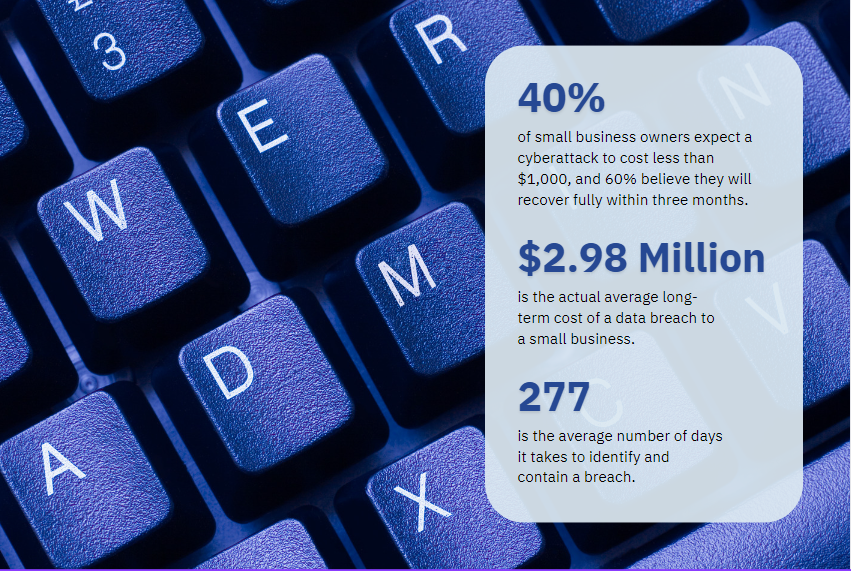
Reason 3: Lack of Awareness
Small business owners are frequently stretched thin for time and may lack dedicated IT departments. As a result, they struggle to keep pace with evolving cybersecurity threats and best practices. This lack of awareness, both at the leadership level and throughout the organisation, leaves small businesses vulnerable to cyberattacks.
Reason 4: Poor Security Measures
Compounding the aforementioned challenges, hackers perceive small businesses as lacking adequate security measures typically found in larger organisations. This includes inadequate firewalls, outdated or absent antivirus software, and insufficient safety awareness training. These weaknesses make small businesses attractive targets for cybercriminals seeking vulnerabilities to exploit.
In conclusion, the combination of limited budgets, easy access to valuable data, lack of awareness, and poor security measures renders small businesses particularly susceptible to cyberattacks. Understanding these vulnerabilities is crucial for small business owners to implement effective cybersecurity strategies and safeguard their enterprises against the growing threat of cybercrime.
The Escalating Risk of Supply Chain Attacks
In today’s interconnected world, supply chains offer cybercriminals enticing and lucrative opportunities for exploitation. By pinpointing weaker links within supply chains, hackers can infiltrate larger, high-value targets such as major manufacturers, freight companies, and credit card issuers. Supply chain attacks are becoming more prevalent and can yield catastrophic outcomes, including disruptions to critical infrastructure and the compromise of sensitive customer data. The surge in supply chain attacks serves as a poignant reminder that fortifying your cybersecurity defenses not only safeguards your own company but also every entity with which you conduct business.
Why Cyber Insurance Matters Today
In today’s world, cyber insurance is crucial for any business. It gives you financial protection if you face data breaches, ransomware attacks, or other cyber incidents. To get the right policy, work with an experienced insurance broker. They’ll help you understand what coverage you need and find a plan that fits your budget. Just like you wouldn’t drive without car insurance, you shouldn’t run your business without cyber insurance.

Think before you click!
Did you know that most cyberattacks start with just one click? Research shows that over 90% of successful cyberattacks happen because someone clicked on a harmful link or email attachment. This seemingly harmless action can lead to serious problems, like data breaches and ransomware, costing companies thousands or even millions of dollars. For many small businesses, the financial impact of a cyberattack can be devastating. By realising that even small actions can have big consequences, business owners can start building a culture of cybersecurity awareness.
How a Normal Looking Email Brought a Business to Its Knees
The following is a representation of just how easily a seemingly standard email can wreak havoc on your organisation. Read to find out what went wrong and how your business can avoid the same mistakes.
Amy is a trusted employee who has worked at the manufacturing company for 15 years.
She is talented, diligent, and regularly handles multiple administrative tasks. On this routinely busy day, an email landed in Amy’s inbox, seemingly from a trusted supplier. There was an overdue invoice that urgently needed payment. “Oh, no. How can this be,” Amy asked herself. She was not one to ever miss a payment, and she felt that overdue balances reflected
so poorly on the business. Amy knew it must be a mistake, so she clicked on the attachment to review the invoice and figure out the issue.
Amy quickly noticed the document seemed odd. So she deleted the email and called the supplier. Their accounting department confirmed the email didn’t come from them. Even though the email was now in the trash, the damage had already been done. With that simple click on the attachment, Amy had unknowingly unleashed malicious code that spread
like wildfire throughout the company’s systems and network. Within minutes, ransomware encrypted data, locked out users, and brought business-as-usual to a screeching halt. Panic swept through the office. And the hackers wanted a lot of money to restore systems and data.
The business owners were shocked at the ransom demands and were rightly concerned that the company might not be able to financially survive the cyberattack. They ultimately mustered up the funds to pay the ransom; but even so, much of their data was still lost or corrupted. Customers also needed to be notified of the data breach, which was surely the right thing to do, but that threatened the trust the company had worked so many years to earn.
The business ultimately survived the ransomware attack, but at a very high cost. Moving forward, they increased their focus on a proactive cybersecurity strategy that included software, testing, cyber insurance, and security awareness training for everyone on their team.
Fostering a Cyber-Savvy Culture in Your Business
In today’s digital age, the threat of cyberattacks is ever-present and constantly evolving. With the rising number of cyber incidents and the increasing costs associated with remediation and ransom payments, it’s crucial for small business owners to prioritise cybersecurity awareness and safety within their organisations.
Now more than ever, small business owners must instil their teams with a mindset focused on cybersafety. Every individual in the organisation plays a vital role in safeguarding the company’s systems and data from cyber threats.
Establishing a culture of safety and awareness entails several key initiatives:
- Regular Cybersecurity Training: Provide ongoing training sessions to educate employees about current cyber threats and best practices for mitigating risks.
- Group Meetings on Cybersecurity: Hold group meetings to discuss emerging cyber threats and reinforce the importance of cybersecurity measures.
- Clear Policies and Procedures: Develop and communicate clear policies and procedures for handling and securing sensitive data, ensuring that all employees understand their responsibilities.
- Inclusion in Employee Handbook: Integrate cybersecurity best practices into the employee handbook to serve as a reference for all staff members.
- Celebrating Cybersecurity Awareness Month: Recognise Cybersecurity Awareness Month each October by organising workshops and activities that promote cybersecurity awareness and reinforce safety measures.
Leadership’s role in promoting a culture of cybersecurity cannot be overstated. Business owners and management teams must lead by example, demonstrating a steadfast commitment to cybersafety.
Encourage open communication throughout the organisation, fostering an environment where employees feel empowered to report security concerns or incidents without fear of reprisal.
By nurturing a culture of cybersecurity, small business owners can significantly mitigate the risk of data breaches and cyberattacks, safeguarding their businesses against potential threats in the digital landscape.
Top 9 Cybersecurity Musts for Your Small Business
While every small business has unique needs and challenges, most organisations should consider the following cybersecurity implementations to ensure the safest security posture possible. Consider engaging cybersecurity experts who can help you with these and other safety implementations and strategies.
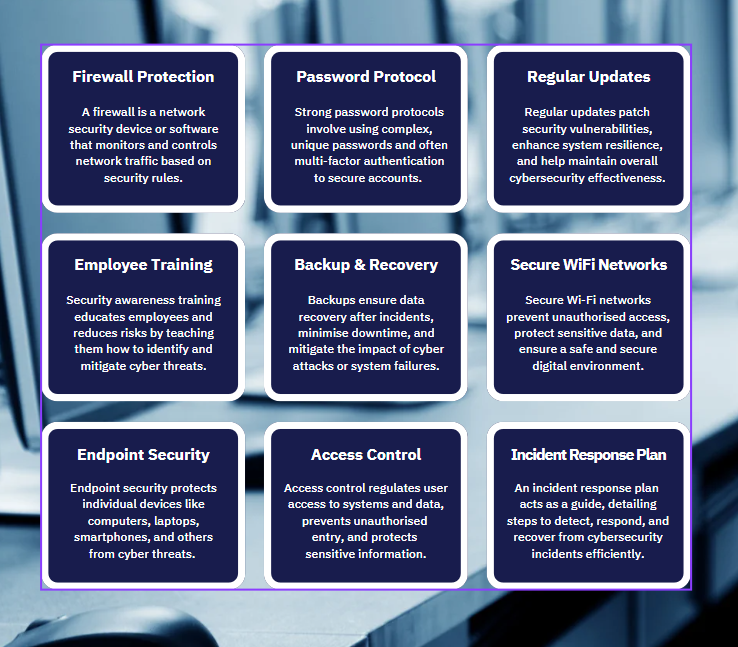
Can Your Employees Spot the Signs of a Phishing Email?
Phishing emails are messages from cybercriminals who impersonate trusted entities. They are designed to trick recipients into taking actions that disclose information, allow financial access, and threaten security. Many phishing emails include red flags that can alert the recipient of malicious intent. Below is an email that has hypothetically landed in your employee’s inbox. Have your team take a look and see if they can spot at least ten telltale signs of a phishing scam.
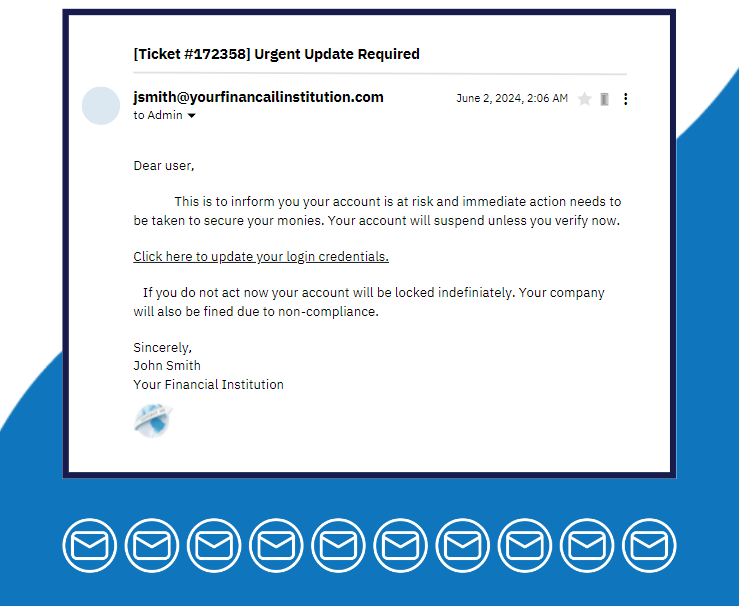
Did Your Team Spot at Least 10 Red Flags?
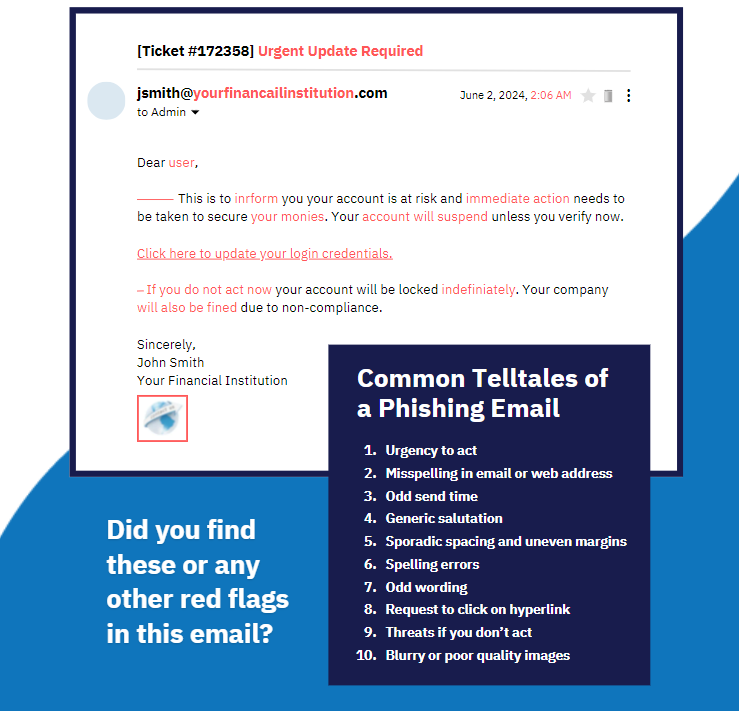
Become a Better Business Leader with the Power of a Peer Advisory Board
The Alternative Board (TAB) helps forward-thinking business owners grow their businesses, increase profitability, and improve their lives by leveraging local business peer advisory boards, private business coaching, and proprietary strategic services.
Becoming a member of The Alternative Board gives you access to resources and expert advice that will help you build a stronger business and grow into a stronger business leader.
Click here to contact us and learn more about the transformative power of a TAB Board.


